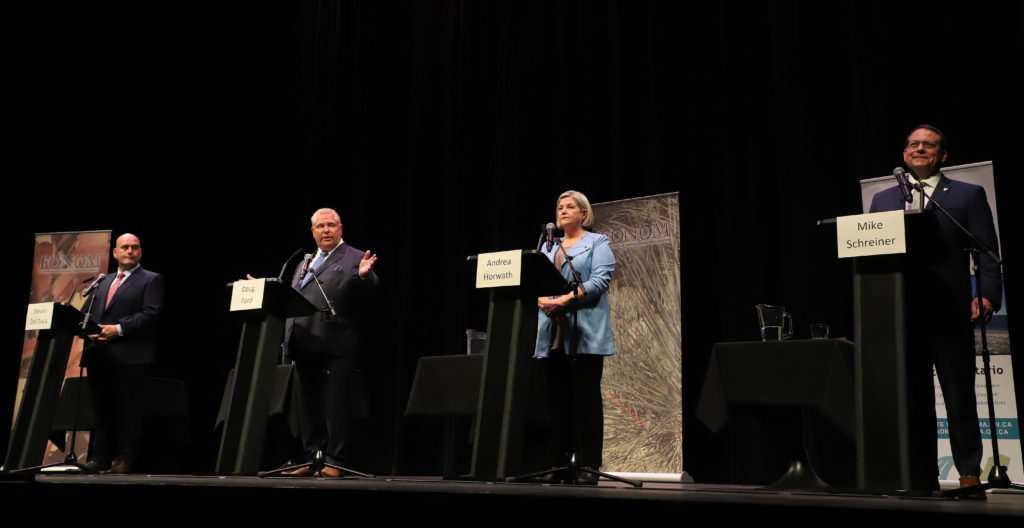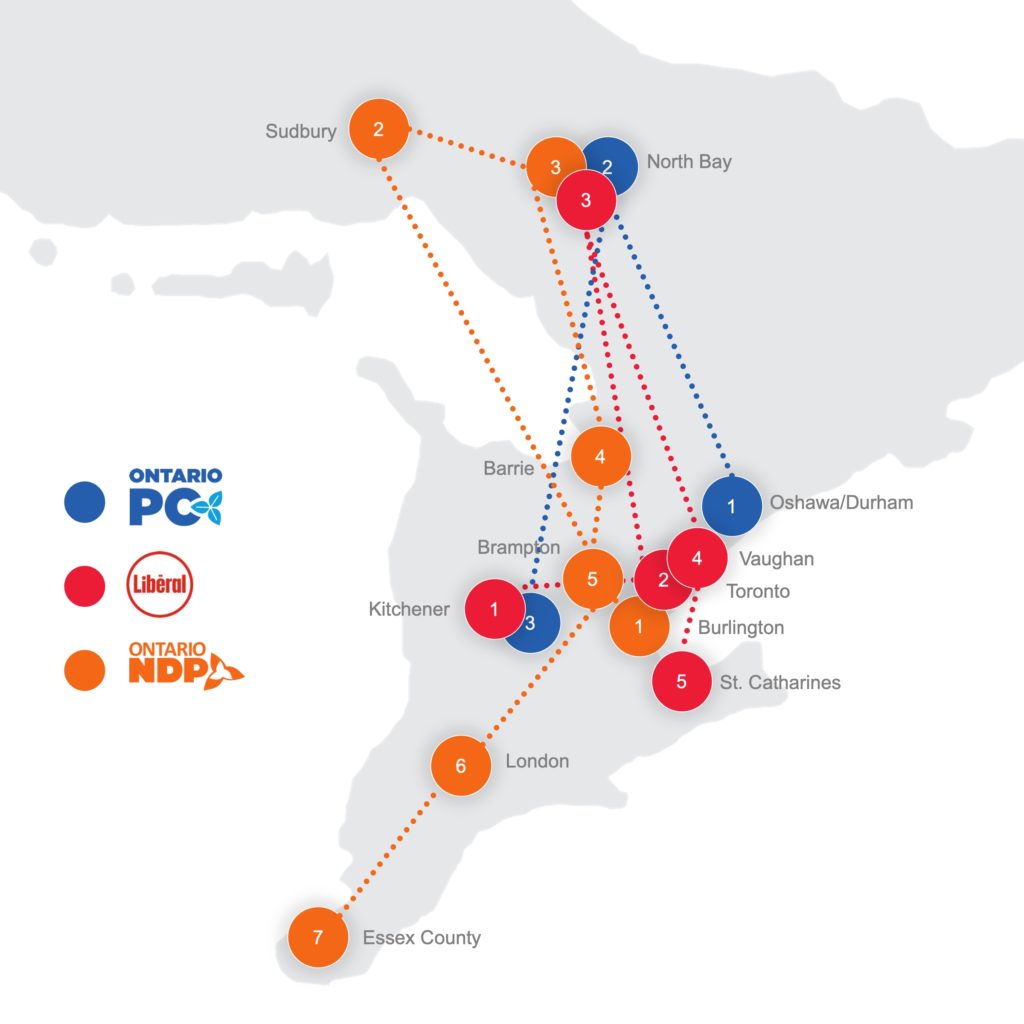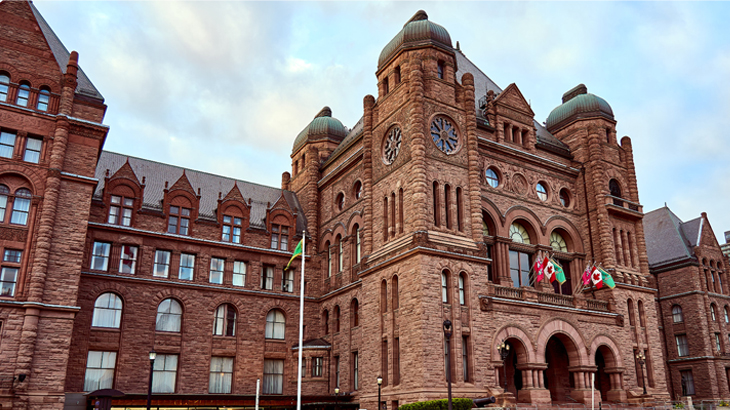Welcome to Earnscliffe Strategies’ Election Insights. This is our weekly analysis of the 2022 Ontario election, summarizing the key issues, strategies motivating the parties and major developments from the campaign trail.

Ready for round two
With the second week of the Ontario election well underway, the leaders of the four parties continue to meet with supporters across the province.
On Tuesday, the leaders faced off in the first official debate, hosted by the Federation of Northern Ontario Municipalities in North Bay. While the debate was focused on issues facing Northern residents, such as resource development, regional transportation and affordability, the leaders sparred over other issues such as Premier Ford’s response to the pandemic, Steven Del Duca’s record as a minister in Kathleen Wynne’s cabinet, and Andrea Horwath’s history in opposition.
As outlined below in Earnscliffe’s latest public opinion research polling, Premier Ford and the PC Party continue to hold a sizable lead in popular support across the province. While the first official debate got testy at times, it featured few notable moments or exchanges. Premier Ford defended his government’s leadership in response to the COVID-19 pandemic. He touted efforts to ramp up domestic production of personal protective equipment in the early phases of the pandemic and the province’s roll out and distribution of vaccines. He also reminded the audience that he stood up to Donald Trump when the former president threatened to block exports of N95 masks to Ontario.
It hasn’t all been offence for the governing party, though. This week, the PC campaign has had to respond to a number of accusations of MPPs and cabinet ministers drawing on allowances through riding association donations to supplement their incomes, a legal mechanism available to all elected MPPs. In recent days, Education Minister Stephen Lecce has drawn harsher criticism and media attention for his participation in a controversial fraternity event as an undergraduate student at Western University.
For their part, the Liberals and Steven Del Duca continued to raise awareness of their platform, “A Place to Grow,” and introduce the largely unknown leader to voters. On Monday, the party released the platform, which outlined $16.4 billion in new spending while also balancing the budget by fiscal year 2026-27. During the debate in North Bay, Premier Ford took Del Duca to task over his track record as transportation minister under the previous Liberal government, outlining a history of inaction on the file which left many Northern Ontario residents feeling left behind. While the Liberals have seen some increases in polling numbers through the campaign so far, the third place party still has a lot of ground to cover in order to catch up with Ford and the PC Party before June 2nd.
The Liberals have also had candidate controversies, on top of Del Duca’s part in the unpopular Wynne government and his role in a controversial GO train station selection as transportation minister. On Thursday the party “fired” their third nominated candidate in as many days. Liberal candidates in Sault Ste. Marie, Chatham-Kent—Leamington and Parry Sound—Muskoka have all been removed from the ballots by the Liberal Party after revelations of homophobic comments made on social media. As well, a book of homophobic and unscientific claims about sexuality in infants which had been self-published by Parry Sound—Muskoka candidate Barry Stanley was unearthed on Wednesday and generated condemnation from the other parties. The Liberals insist now former-candidate Stanley did not disclose the existence of the book during the candidate’s vetting process. The party and leader condemned the views and comments of the three individuals and reaffirmed their commitment to not accept candidates with a history of homophobia or bigotry.
With Affordability dominating the polling early in the campaign, Andrea Horwath and the NDP announced a commitment to lower auto-insurance by 40 per cent if elected in June. They later followed up with a re-announcement of their commitment to bring mental health care under OHIP, adding the detail that their plan is estimated to save the average Ontarian $200 a visit.
While early polling has yet to show a major shift, the upcoming debate on May 16th could be an important opportunity for Horwath and the NDP to position themselves as the one true “Ford fighter”, hoping to make an appeal to a porous Liberal vote that still hasn’t coalesced under their own party’s banner and could be motivated to support the NDP if it meant removing Doug Ford as premier. It remains to be seen if that pitch will work with three weeks still to go.
Of note as well is the Ontario NDP campaign’s efforts this week to take the Conservative campaign off its stride, revealing that a number of PC MPPs, including Cabinet Minister Lisa MacLeod have been drawing a cost of living/housing allowance from their riding associations on top of their MPP salaries. Another ONDP campaign release highlighted education minster Lecce’s 2006 attendance at a university “slave auction” fundraiser – drawing out an apology from Mr. Lecce for his attendance. We can expect more of this type of negative campaigning from all sides as we draw closer to election day and as the opposition looks to try and chop away at the Conservative’s current lead in the polls.
On the campaign trail

Election polling
Since last week, when our tracking data indicated the race may be tightening, the Progressive Conservative Party of Ontario (PC) has managed to shore up support. This week’s vote intent numbers, based on an online survey of 1,000 Ontarians of voting age conducted between May 6 to 8, shows the PCs at 39% of the decided and leaning vote, the Ontario Liberal Party (OLP) at 27% and the Ontario New Democratic Party (NDP) at 24%.
Key dates
- Thursday, May 12: Deadline for nominations
- Monday, May 16: TV Ontario Leaders’ Debate
- Thursday, May 19 to Saturday, May 28: Advance voting period
- Friday, May 27, 6:00 p.m. ET: Vote by mail application deadline
- Thursday, June 2: Election Day
